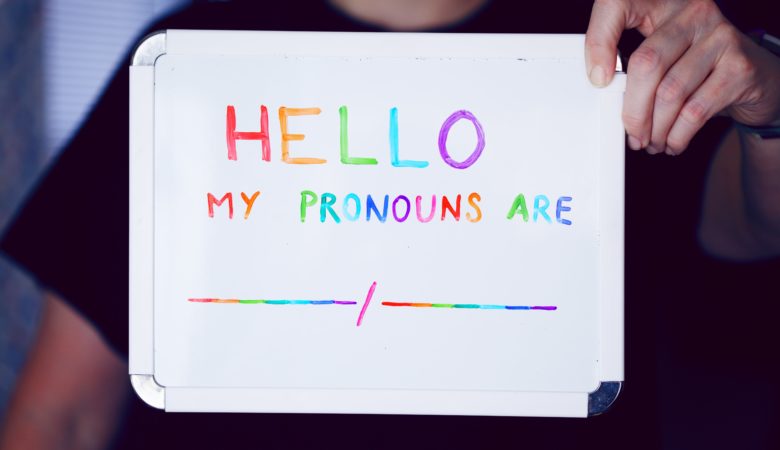She/He/They: The Power of Pronouns in Our World Today

Do you take for granted that people know you want to be referred to as “he” or “she?” If so, you might be part of a majority—but that’s also a privilege. Today, as our society learns more about and becomes more accepting of transgender and nonbinary folks, the topic of pronouns is becoming more prevalent. It’s common to see people list their pronouns (such as “she/her” or “they/them”) in their email signature or social media bios, but what does it all mean? Here’s an overview of why pronouns are so important.
The power of choice
Depending on your generation, you may have grown up knowing that people can choose their pronouns—or this may be a completely radical idea to which you’re still adjusting. The basic idea is this: we might be born into certain bodies, but those bodies and their appearance don’t necessarily reflect the gender we are. In some cases, a person might feel that they exist on a gender spectrum, where they feel more masculine one day or feminine the next. In fact, “non-binary” as a gender option is increasingly included on surveys, administrative forms and applications.
Ultimately, using someone’s chosen pronouns is a matter of respect. It doesn’t matter if your perception of them matches the pronouns they’ve asked you to use: what they’re saying is that this is how they want to be addressed. It’s similar to if their name were Jennifer and you insisted upon calling them “Jen,” despite their protests. You might think it doesn’t matter, but they do.
Gender is a spectrum
For millennia, people have accepted that gender is a binary: either you’re male or female, with nothing in between. This is closely related to the idea of sex, but not synonymous.
Often, one’s anatomy determines their sex, but that’s not always the case. Although somewhat unusual, there are indeed people who are born intersex, which is “a general term used for a variety of conditions in which a person is born with a reproductive or sexual anatomy that doesn’t seem to fit the typical definitions of female or male.”
Whether you’re born male or female, you may find that you identify with the “opposite” sex—or both, depending on the day.
The idea that gender is a spectrum is relatively recent, but there have been numerous gender-defying luminaries over the years. On top of that, transgender people are gaining acceptance in society at large, challenging the notion that you’re stuck with the gender and sex you’re assigned at birth. This allows people to feel free to be who they really are.
In addition to “she” and “he,” some people prefer to use the pronouns “they/them,” which indicates they’re on the gender spectrum but may not strongly identify as male or female.
As society continues to evolve, expect that transgender and nonbinary people will continue to gain widespread social acceptance. You can be at the forefront of this inclusivity by respecting others’ pronouns.
Why is it so important to use the right pronouns?
When you make assumptions about someone’s gender, it can make them feel dismissed or alienated. Just because someone comes across as a particular gender does not mean it’s the one with which they most identify.
Using the right pronouns—and asking someone what their preferred pronouns are—is a polite and inclusive way to show allyship. You can start the discussion by introducing yourself and naming your own pronouns, such as, “Hi, I’m John and my preferred pronouns are he/him.” Whether the person you’re talking to chooses to share their own pronouns with you, it’s one way to normalize the idea.
Another way to normalize gender inclusivity is to choose your language carefully. For example, “ladies and gentlemen” can be switched out for “folks,” “friends” and other gender-neutral language. One popular podcast for insomniacs, Sleep With Me, greets the listeners with “Ladies, gentlemen and friends beyond the binary.” Even “hello everyone” or “y’all” is preferable to “you guys” or other gendered language, according to the SDSU News Center.
Does it take practice? Yes. Can you make these small changes to be more inclusive? Absolutely. While everyone can and will make mistakes, regardless of where they fall on the gender spectrum, making inclusive overtures is never a bad idea. It can be awkward if it’s your first time—but to a person who feels like no one respects their gender identity, asking for their pronouns can make all the difference in the world.

